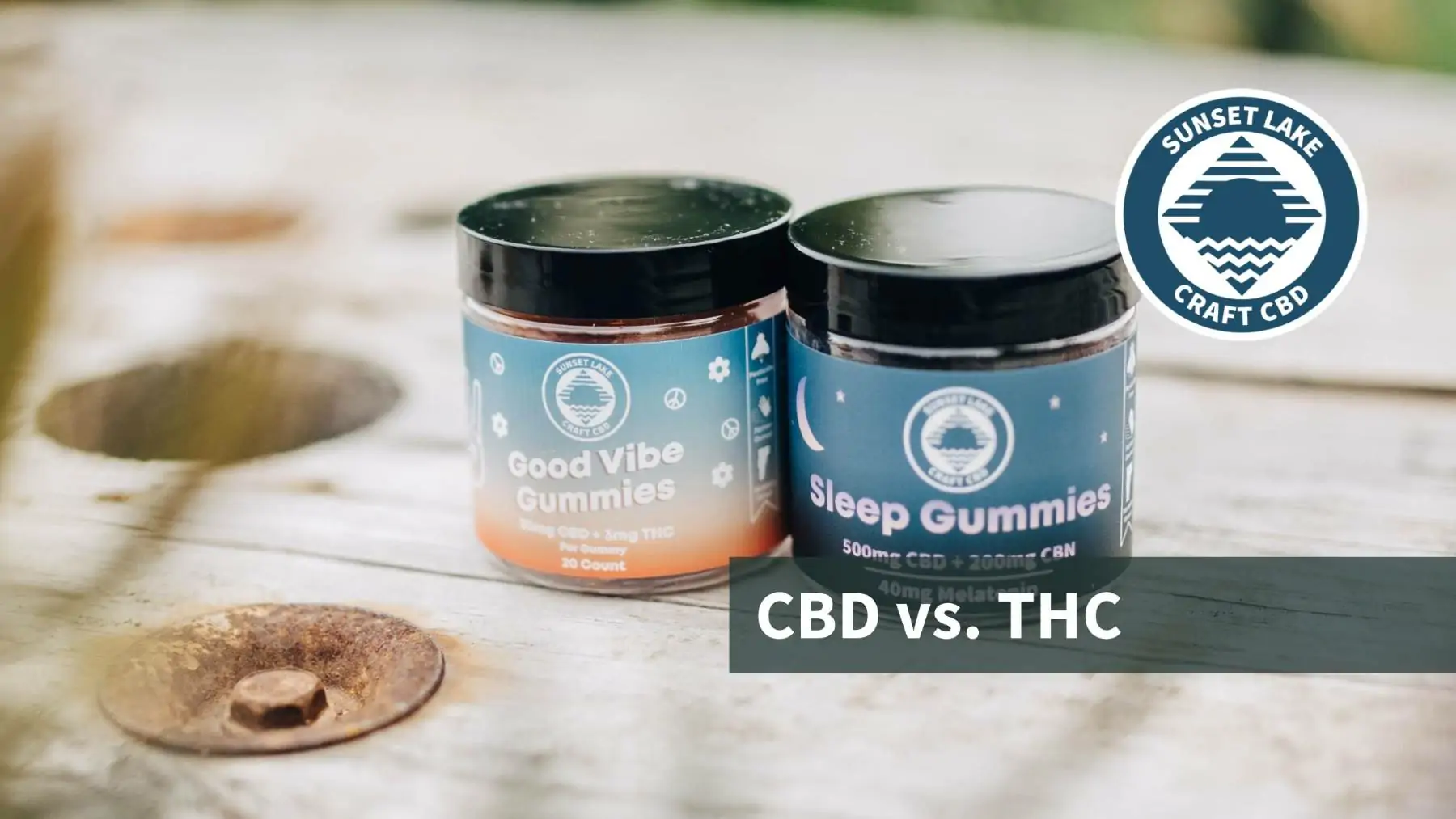No products in the cart.
CBD vs. THC: Differences and Similarities

As more and more of us are introduced to cannabis flower and cannabis products, the topic of CBD vs. THC comes up quite a bit. Both are naturally occurring compounds (cannabinoids) in the Cannabis Sativa L. plant. Both interact with your body’s native endocannabinoid system. So what’s the difference between CBD and THC?
In the rest of this post, we’ll cover,
- The differences between CBD vs. THC
- The similarities
- Other common cannabinoid questions
CBD vs. THC: How Different Are They?
CBD and THC Both Come from the Cannabis Sativa Plant
As we mentioned in our introduction, both CBD and THC come from the Cannabis Sativa L. plant.
If you’re familiar with the Sativa and Indica distinction, don’t worry, your Indica plants will still produce all of the relevant cannabinoids. Cannabis Sativa L. is the overarching genus that covers all cannabis plants— Sativa, Indica, and Ruderalis (auto-flowering)
The concentrations of CBD vs. THC that appear in a specific cannabis plant are determined by that plant’s genetics. For example, medical marijuana is bred to have high THC content, whereas CBD hemp flower is bred to have very low THC and more CBD content. To the naked eye, the marijuana plant and hemp flower plant may be indistinguishable.
Both CBD and THC are formed in trichomes during cannabis’s flowering stage— the latter half of the plant’s life cycle. To the naked eye, trichomes look like mushroom-shaped growths on the cannabis plant’s flower. Inside each trichome head, cannabinoids, terpenes, and flavonoids develop, giving each plant its own unique profile.
What does CBD stand for? Read more here!
CBD vs. THC and Their Similar Chemical Structures
Both CBD and THC have very similar chemical makeup. Both molecules contain
- 21 Carbon atoms
- 30 Hydrogen atoms
- 2 Oxygen atoms
The difference between CBD and THC lies in their atomic arrangement which allows each to affect your body in different ways.
CBD and THC are chemically similar to endocannabinoids that your body produces. This similarity allows them to interact with endocannabinoid receptors all over your body.
These interactions between CBD, THC, and our own native endocannabinoid systems cause the release of different and specific neurotransmitters. These neurotransmitters play an important role in a range of bodily functions that we’ll get into below.
How Do CBD and THC Interact with the Endocannabinoid System (ECS)?
CBD and THC both interact with our endocannabinoid system— a network of receptors and neurotransmitters that help us regulate,
- Sleep
- Mood
- Stress
- General appetite and metabolism
- Memory and learning
- Inflammation
Whereas THC has been observed bonding directly with certain CB1 receptors in the brain, CBD is believed to interact with the ECS by facilitating and protecting our naturally produced endocannabinoids. One can think of CBD as a more passive cannabinoid when compared to THC.
There is still a fair amount of research to yet be undertaken regarding CBD and its interaction with the ECS, but some early studies suggest that CBD may help users with pain management, feelings of nausea, and other symptoms related to inflammation.
THC Is Psychoactive, CBD Is Not
THC, and more specifically delta-9 tetrahydrocannabinol, is famous because of the psychoactive, or “high,” feeling you get after consumption.
Juxtapose the high of THC to CBD. After consuming CBD hemp flower (containing only trace amounts of THC) one doesn’t experience that same “high” at all. That’s because CBD is considered a “non-psychoactive” compound. In fact, it’s thought that CBD actually curbs some of THC’s less-desirable effects.
Read more: What Does CBD Feel Like?
Side Effects of CBD vs. THC
While neither CBD nor THC is physically dangerous just by itself at any conceivable consumption level, both present users with a different set of side effects at higher doses.
THC can cause temporary side effects like:
- Elevated heart rate
- Dry mouth (colloquially known as cottonmouth)
- Red eyes
- Slowed reaction times
- Anxiety
- Memory loss
- Problems with coordination
- Appetite changes
CBD can cause side effects like:
- Fatigue
- Weight loss
- Dizziness
- Dry mouth
- Diarrhea
Of course, we want to stress that these side effects can occur from lone use of that cannabinoid. They don’t take into account the interactions between either CBD or THC and any medications you may take.
The Legality of CBD vs. THC
THC Is a Schedule I Substance
As of this writing in September 2021, marijuana, THC, and some THC isomers derived from hemp are still federally prohibited and still sitting on the DEA’s Schedule I substances list meaning the DEA doesn’t consider THC to have any medical use.
This is an especially confounding designation considering that 36 states and the District of Columbia have enacted policies allowing physicians to prescribe medical marijuana and products containing THC.
Hemp Is an Industrial Commodity
CBD on the other hand, was more or less federally legalized via the 2018 Farm Bill. Hemp containing less than 0.3% of THC by dry weight was henceforth considered a legal industrial commodity.
Because CBD was and is considered a legal industrial commodity, Judge James Gilbert authorized its transport in the KAB vs. United States Postal Service case when he declared that products derived from hemp were allowed to be shipped via the postal service.
CBD vs. THC: Which Will Show Up on a Drug Test?
THC, even in the trace amounts that are legally allowed to be present in whole-plant (also known as full-spectrum) CBD products, can still show up on a drug test. As of now, all CBD hemp plants contain some amount of delta-9 THC and THCa (the precursor to delta-9 THC)
Most urine-based drug tests are looking for the presence of THC metabolites. When you consume either full-spectrum CBD or THC products, whatever THC is present will break down once your body is done with it and be expelled. Unfortunately for CBD users, drug tests are unable to discern an “acceptable level” of these THC metabolites. Instead, a user is often judged on the presence of the metabolites.
Read more: Does CBD Show Up On Drug Tests
CBD Isolate will not show up on a Drug Test
Unlike whole-plant CBD, products that contain CBD isolate will not cause you to test positive on a drug test. Because these products have had all THC chemically removed before infusion, your body will have no THC to turn into metabolites.
If you’re worried about random workplace drug testing you should check out Sunset Lake CBD’s Sour Bears made with 100% CBD isolate.
CBD vs. THC: The Takeaway
CBD and THC both have their uses, and both are considered relatively safe for adult use. Users may experience some undesired side effects with higher doses.
Ultimately though, if you’re looking for a federally-legal, non-psychoactive way to consume cannabis, CBD products and CBD hemp flower are a sure and safe bet for you.
Sources
- Alger, Bradley E. “Getting high on the endocannabinoid system.” Cerebrum: the Dana forum on brain science vol. 2013 14. 1 Nov. 2013
- Shapiro, Gary E. “P.S. Docket No. MLB 18-39.” USPS, 8 Nov. 2018 <https://about.usps.com/who-we-are/judicial/admin-decisions/2018/mlb-18-39-fd.htm>


